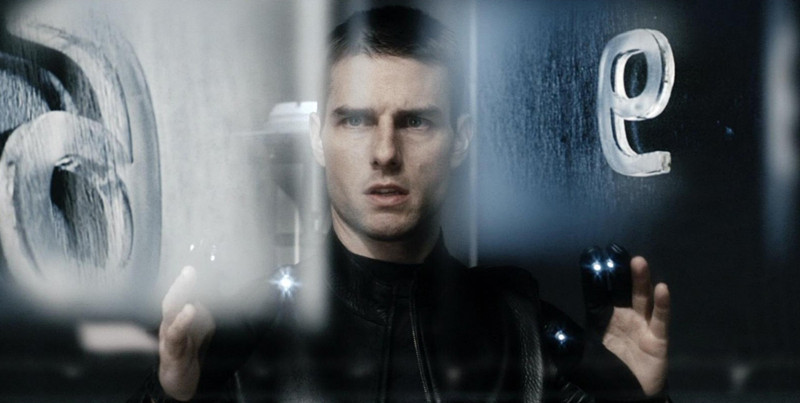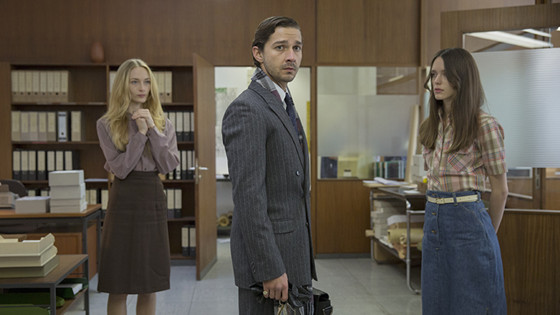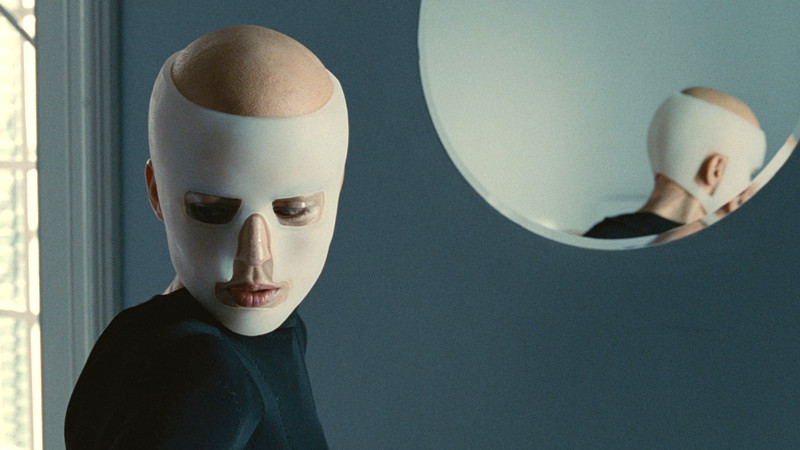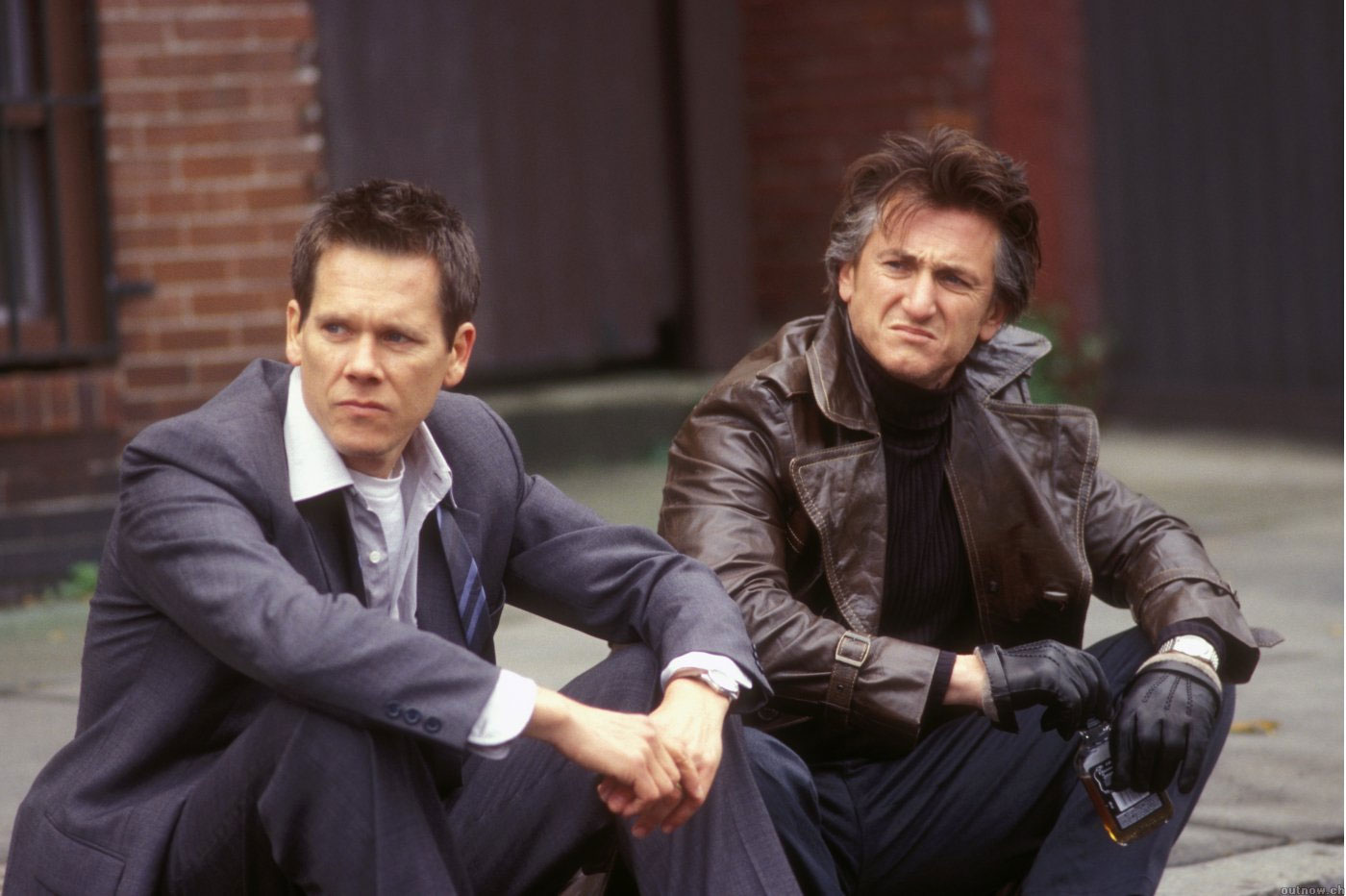6. Fight Club (David Fincher, 1999)

Due to the cult nature of “Fight Club”, I am sure most people reading this would be able to relate, without a need of a summarizing elaboration on the story.
It’s hard to say something about “Fight Club” that hasn’t already been said. It’s simply one of the most creative, expressive, and philosophically overwhelming portrayals of the human condition ever filmed.
It goes without saying that it’s one of the most iconic films of the millennium that deals with far more than just the concept of determinism; it’s simply about everything wrong with modern lifestyles, everything wrong with modern society, everything wrong with the modern man, and everything wrong with everything.
There’s this brilliant illustration of the paradoxical psychological relation between one and one’s self. Tyler/The Narrator (Edward Norton/Brad Pitt) is trying to predict his own actions before himself in order to put an end to them before they occur, or to evade their consequences after they do.
Yet at the same time, predicting his own actions is in return predicted by his other self, which is a mirrored version of himself that, despite being drastically different and reversed, it still echoes each and every action he makes and again, in reverse action, that might as well undo the original one.
It’s about a man stuck in an infinite dark mirror tunnel of selfness, helplessness, and futility that goes on and on through the ongoing conflict of man vs. himself and his drives, and man vs. society at large; in other words, man vs. determinism. Morality is diminished, and moral responsibility is hard to identify when man becomes the anti-societal product of the deterioration and decadence of the society itself.
It’s about a man stuck in himself that is stuck in a bigger world that is insanely wrong, repressively authoritative, pathologically mainstream, addictive and materialistic, and this man’s attempts to grow bigger than this world, bigger than his life, and bigger than himself in a way that might as well be bigger than what he can afford to control.
7. Minority Report (Steven Spielberg, 2002 )

“Minority Report” is an allegory of the triumph of free will over determinism. It’s about all these crucial actions that we unexpectedly make, against our instincts and natural drives, in drastically life-changing situations that have the capability and power to turn everything around and change our destinies forever.
The story discusses determinism in a place halfway between complete anti-determinist disapproval, and soft determinist acknowledgment of free will.
In the film, a minority report is the proof of a flaw that exists in the PreCrime technology, a technology designed to predict crimes before they occur by mutilated humans who have the talent of pre-visualizing certain events in the future (Precogs). The PreCrime Police then makes use of the reported visions of the future to prevent crimes before they occur, and lock away potential criminals.
A minority report is made when one of the three Precogs, most often a one named Agatha, reports a different previsualization of a crime that might negate its possibility of occurring.
In the film, the utilization of PreCrime technology is actually a very determinist approach to judge humanity, because all the criminals convicted in the story are people who had certain deterministic causes, whether internal or external, to commit a certain crime, but who still haven’t physically committed it yet. It’s about not trusting humanity with free will, and as result, distorting the concept of moral responsibility.
The hero of the film, John Anderton (Tom Cruise), is a victim of that determinist vision of humanity, of the PreCrime technology. After finding out the Precogs generated a new prediction accusing him of a future murder, he escapes, embarking on an unexpected quest to prove his own innocence.
He learns, from the creator of PreCrime, about the minority report for the first time, realizing how it could bear witness to his innocence, but the problem is, it was long kept as a secret since it would jeopardize the credibility of the entire PreCrime system.
After kidnapping Agatha to extract an alternate vision from her about his future, he goes through a series of complications that leads him to almost inevitably committing the pre-visualized crime, because the predicted victim is a man who confesses to him that he was the one who kidnapped his son years ago, destroying the life of him and his family forever.
He now has to choose between his vengeful drives and fulfilling his revenge, or proving his innocence through his will to change his predestined future. He surprisingly makes the second choice, breaking the conventions of predestined fate, and giving triumph to the power of free will.
However, he’s left with a dead corpse, which is part of a setup to put him away. With the assistance of Agatha and his wife, he uncovers a huge conspiracy that involves the murder of Agatha’s mother, and in which the founder of PreCrime might be involved.
8. Nymphomaniac (Lars von Trier, 2013)

Lars von Trier’s controversial “Nymphomaniac” deals with biological determinism and sexuality. What I like about this film, which many other films dealing with sexuality get wrong, is the vast portrayals of sexual identities.
Not a single character in the film shares the same sexual identity with another. All characters in the world of “Nymphomaniac” have different and unique sexual preferences and perversions that are not all necessarily revealed in the film, but are implicitly implied, since many characters in the film are not sexually what they initially seem to be.
A notable scene that demonstrates this is the interrogation scene, where Joe (the nymphomaniac protagonist portrayed by Charlotte Gainsbourg) is trying to identify the sexual identity of a man she’s interrogating. She comes up with many sexually provocative scenarios that surprisingly don’t arouse him; his sexual identity appears to be very vague, until eventually a scenario involving a child arouses him, and we learn about his long closeted pedophilia.
Earlier in the film we are introduced to Seligman (Stellan Skarsgård), the highly educated man who shelters Joe after finding her beaten up, and listens to the erotic and improbable story of her life. At some point in the story, she questions Seligman’s sexuality after noticing his lack of conventional sexual excitement about the erotic details of her narrative. In defense, he describes himself as an asexual being.
Upon finishing her story and towards the end of the film, she gets this momentary feeling of inner peace and decides to stop at that point in her story and go to sleep. Seligman later walks in on her sleeping and attempts to rape her. On one hand, this could possibly suggest that as long as we possess sexual organs, there’s no such thing as asexuality, and on the other hand, that more often than not, there’s closeted sexual perversions in humans.
Another one of the film’s tangent points with determinism is revealed when Joe finally admits that her efforts to control and restrain her sexuality came to fail, and throws a harsh speech in which she insults her mates in the sex addict support group and declares pride in her nymphomania, which she refuses to refer to as a pathological condition.
Further into this, we encounter, at the beginning of chapter 7, her desperate attempts to rid her life of everything that sexually arouses her or references her sexuality. It turns out to be almost everything around her, from pornographic illustrations and door handles to her mirror, yet she still rids her life of all these details and locks herself away from everyone. All of her attempts come to nothing, but the realization that she’s incapable of changing who she is.
9. The Skin I Live In (Pedro Almodovar, 2011 )

Bizarreness, improbability and the obsession with sexual identity aren’t anything new to Pedro Almodovar.
“The Skin I Live In” is an eventful story about obsession, denial, madness, and the loss of sexual identity vs. biological determinism. In the film, Robert Ledgard (Antonio Banderas) is a successful surgeon who has just discovered an effective way of cultivating artificial human skin that is resistant to burns; however, his experiments are officially suspended due to his misconduct of unauthorized transgenic experiments on human.
We are introduced to Vera, a woman he keeps captive and on whom he first tries the skin. Another character gets involved in the story, a man named Zeca who would later be identified as Robert’s brother from a different father. Zeca manipulates his mother into letting him into Robert’s house where he consequently rapes Vera, for whom he shows recognition as someone else.
And now we get to know that Vera, recognized by Zeca as Robert’s late wife, is a recreation of that wife with whom Zeca used to have an affair. But what is Vera? How did she become who she is? Could she be purely Robert’s creation?
Through a recollection of Vera’s memories, we get to know Vicente, a new character. Or isn’t he? Vicente works in a dress shop with his mother; he has a crush on his lesbian colleague Cristina, and later in his story he happens to attend a wedding where Robert and his traumatized daughter Norma (who witnessed her mother’s suicide years earlier) are present.
Under the influence of drugs, he takes Norma to the garden to make love, but it gets complicated with the psychotically ill Norma, whose father finds later laying on the ground with a persistent delusion that he himself raped her.
As an aftermath of all this, Robert kidnaps Vicente and subjects him to sexual reassignment as punishment for what he thinks he did. With this, Vicente gradually becomes Robert’s guinea pig. He recreates his beloved deceased wife in him, experiments his new skin on him, and keeps him (now her?) captive in a room in his house where he monitors him/her most of the time.
When Vera finally escapes after she manages to kill Robert, she goes to the dress shop for the first time in years, and meets with his/her dream girl Cristina for the first time in years, to declare that she used to be Vicente.
Upon learning this, Cristina calls out for Vicente’s mother, and there’s prolonged silence and shock in a paradoxically ironic scene that suggests many possibilities.
Would he, now that he became a “she”, be a lesbian if “she” finally manages to get romantically involved with Cristina? Yet if she, knowing deep inside that she used to be a “he”, submitted to Robert earlier, would that have been an implication that Robert finally managed to change Vera’s sexual orientation along with her sex, which used to be referred to as “his sex.”
And in that case, could we consider him gay since he was originally a male, or heterosexual (since he’s now biologically a female, so it’s only right), or a lesbian (since his sexual behavior is gay, yet he’s now a female, which we refer to in the case of homosexuality as “a lesbian” not a “gay”).
This bizarre confusion doesn’t really matter, because the bottom line of all this is that Vicente eventually kept his sexual identity and his attraction to women. Regardless of his sex reassignment, his sexual identity was unchangeable because it was determined long ago, and now it’s more than his sex.
He didn’t enjoy the female bottom role in sex, with Zeca nor with Robert, and he didn’t accept living as a woman with Robert. It’s a very powerful implicit statement on the determinism of sexual orientation and a denial of all attempts to control it, because when it comes to “The Skin I Live In”, you can control people sexes, yet you can’t control their preferences, choices and orientations, which they also are incapable of controlling. Maybe Almodovar himself, being gay, had it all figured out better than many of us.
10. Mystic River (Clint Eastwood, 2003)

I will refrain from elaborating on the storyline, and focus more on analyzing some of the important implicit details in the film. So it’s highly suggested that you watch the film beforehand in order to be able to comprehend the content of this review.
When it comes to our topic, “Mystic River” is actually the reason why I wrote this article in the first place. Actually, I doubt I had a real clue of what “determinism” meant before watching this film, so I guess I saved the best for last.
“Mystic River” is a thought-provoking, philosophical portrayal of determinism that questions moral human dilemmas, existential crises, and alters the concept of moral responsibility in thought provoking ways.
Every action and event in the film could be traced back on a chain of causality to a far earlier choice, action or another cause that accumulatively brought it about in a way that makes the story multidimensional in terms of time, space and characters.
The story starts with the young Dave’s kidnapping by two strangers in car. They take him and lock him in a basement for three days, during which they subject him to sexual molestation.
Though this almost completely unfolds in the first act of the film, we could consider it the major event in the story that initially triggered everything afterwards.
It’s consecutively implied in dialogues between the characters throughout the film, that “going into that car” or lack thereof, drastically determined everything in the lives, life choices, and moral choices of the three childhood friends, David Boyle (Tim Robbins), Jimmy Markum (Sean Penn), and Sean Devine (Kevin Bacon).
It was implied in a conversation right after Jimmy murders Dave, upon mistakenly suspecting him of killing his daughter:
Sean : So Jimmy, when was the last time you saw Dave?
Jimmy : The last time I saw Dave…
Sean : Yeah, Dave Boyle.
Jimmy : Dave Boyle…
Sean : Yeah Jimmy, Dave Boyle.
Jimmy : That was twenty-five years ago, going up this street, in the back of that car.
This is also implied in the conversation between Jimmy and Sean at the police station.
Jimmy: Did you ever think about how one little choice could change a whole life? I heard Hitler’s mother wanted to abort him. At the last minute, she changed her mind. See what I mean?
Sean: What do you mean, Jimmy?
Jimmy: What if you or I had gotten into that car instead of Dave Boyle?
The part about Hitler’s mother is an explicit acknowledgment of the deterministic chain of causality that brings about all events in the world and determines our every action. Jimmy elaborates after that, “If I’d gotten into that car that day, my life would have been a different thing. My first wife, Marita, Katie’s mother… she was a beautiful woman.
Regal. As a lot of Latin women are, and she knew it. You had to have balls to go near her, and I did. Eighteen years old, the two of us. She was carrying Katie. Now, here’s the thing, Sean. If I’d gotten into that car, I’d be a basketcase. I never would have had the juice to go near her. And Katie never would have been born. And she never would have been murdered. You know?”
We might as well say that he wouldn’t either have been causally lead into consequently killing Dave. And hence, it’s implicitly suggested that it goes the same way with the murderers of Katie Markum (most notably, Silent Ray), who had an external deterministic cause to do it that could be superficially explained by mere chance, but implicitly it’s something far more sophisticated that could refer to a sense of moral retribution.
After their arrest, and Sean’s reporting that to Jimmy, Jimmy asks him about the reason why they did it. “They don’t know why they did it,” Jimmy says, but I believe the film is trying to implicitly tell us that the reason is because Jimmy Markum murdered Ray Harris, the father of one of the two murderers of Katie Markum, over 14 years ago.
From an objective perspective, it’s not retribution as much as it is a butterfly effect that traveled over years and events in a series of consecutive causes and effects that started with Dave’s kidnapping, passed through Ray Harris’s murder, and eventually ended with Katie’s demise.
Brandon Harris, the brother of one of the murderers, was affectionate towards Katie, and Jimmy was always trying to stand in his way. Yet, against all odds, it’s Silent Ray, the younger clueless brother, who murders Katie upon making an accidental mistake. He murders her and he doesn’t even know why, yet we supposedly know.
“I know in my soul I contributed to your death,” Jimmy says to himself after Katie’s death, and it’s a clear possibility in the film that it was his choice to murder Harris that triggered the chain of events that led to Katie’s death. So in a deterministic sense of the word, Jimmy is the one responsible for his daughter’s demise.
And in the same sense, Dave’s kidnappers are morally involved in his future death.
On some level, all the characters could be free of moral responsibility, because we don’t get to know what might have their lives been if they changed roles, and whether Dave could be the one to kill Jimmy in the future, if Jimmy had gotten into that car instead.
Sean: Sometimes I think… I think all three of us got in that car. And all of this is just a dream, you know?
Jimmy: A dream, sure.
Sean: In reality, we’re still 11-year-old boys locked in a cellar imagining what our lives woulda been like if we’d escaped.
Jimmy: Maybe you’re right. Who the fuck knows?
Author Bio: Saad is an aspiring independent Egyptian film-maker and visual Artist. He’s just got his bachelor’s degree in applied arts and sciences from the media-design department in the GUC, where he studied art ,design, film-theory and film-making for 4 years. He thinks of film as the most important medium for contemporary art and literacy.